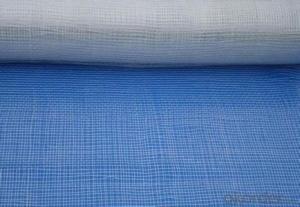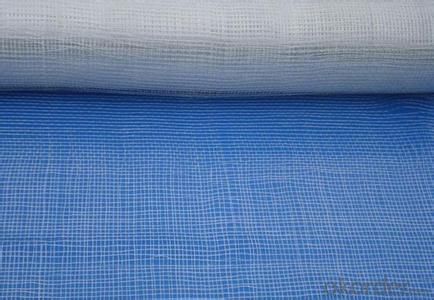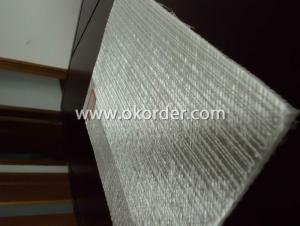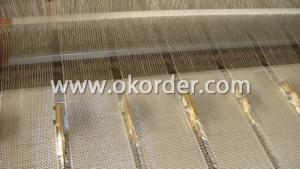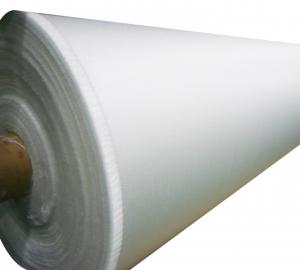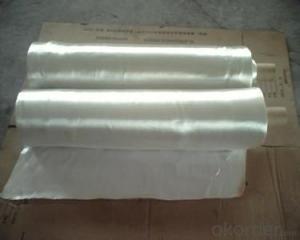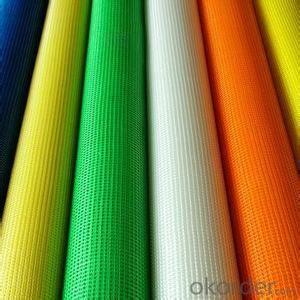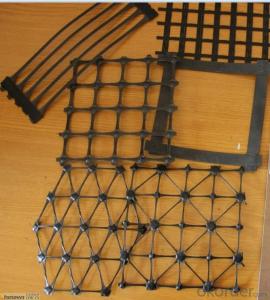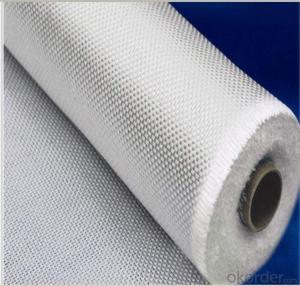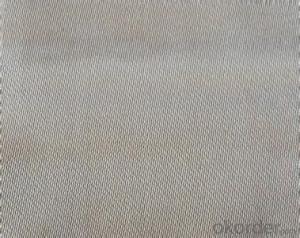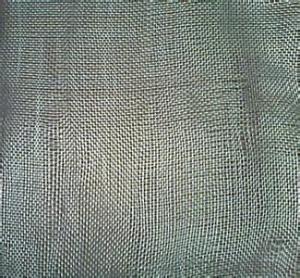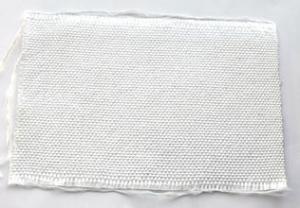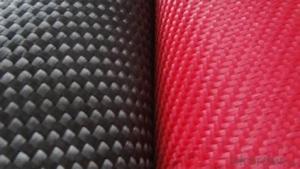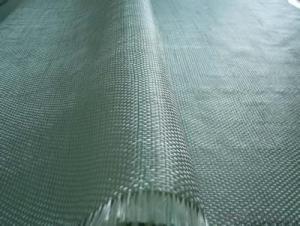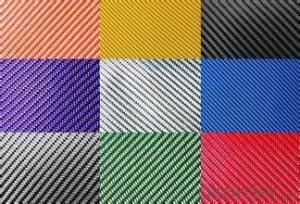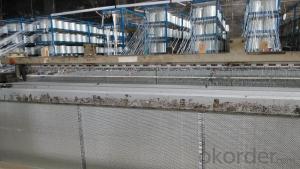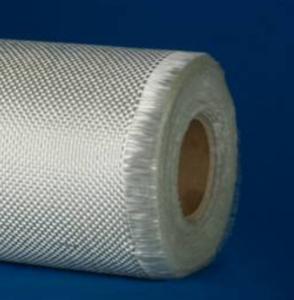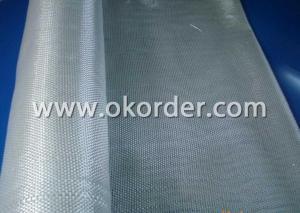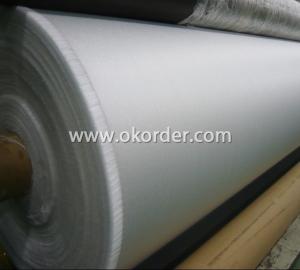High Silica Fiberglass Fabrics Cloth Fabric
- Loading Port:
- China Main Port
- Payment Terms:
- TT OR LC
- Min Order Qty:
- -
- Supply Capability:
- -
OKorder Service Pledge
Quality Product, Order Online Tracking, Timely Delivery
OKorder Financial Service
Credit Rating, Credit Services, Credit Purchasing
You Might Also Like
Quick Details
| Place of Origin: | Brand Name: | Model Number: | |||
| Application: | Weight: | Surface Treatment: | |||
| Width: | Weave Type: | Yarn Type: | |||
| Alkali Content: | Standing Temperature: |
Packaging & Delivery
| Packaging Detail: | 50m/carton |
| Delivery Detail: | about 20days |
Specifications
1. High silica glass fiber cloth.
2. High temperature resistance.
3. Instant working temp.: 1400C degree
- Q: Are there any specific certifications or standards for fiberglass fabrics?
- Yes, there are specific certifications and standards for fiberglass fabrics. One of the most recognized standards is ASTM D579-04, which establishes the requirements for woven and non-woven fiberglass fabrics used in various applications. Additionally, the American National Standards Institute (ANSI) and the International Organization for Standardization (ISO) have established standards such as ANSI/UL 723 and ISO 1182 that evaluate the fire resistance and flammability properties of fiberglass fabrics. These certifications and standards ensure the quality, safety, and performance of fiberglass fabrics in different industries.
- Q: What are the different fiberglass fabric finishes for UV resistance?
- UV resistance in fiberglass fabric can be achieved through various finishes. These finishes are applied to the fabric's surface to shield it from the harmful effects of UV radiation. Different finishes are available for UV resistance in fiberglass fabric, including: 1. Silicone Coating: This finish is ideal for applications that require high flexibility and heat resistance. It offers excellent UV resistance and is commonly used in industries like aerospace, automotive, and construction. 2. Acrylic Coating: Known for their durability and resistance to abrasion, acrylic-coated fiberglass fabrics offer good UV resistance. They are commonly used in outdoor applications like awnings, canopies, and outdoor furniture. 3. PTFE Coating: Polytetrafluoroethylene (PTFE) coatings provide exceptional UV resistance and are famous for their non-stick properties. They are often used in applications that require low friction, high heat resistance, and UV protection, such as conveyor belts, release sheets, and insulation covers. 4. PVC Coating: Polyvinyl chloride (PVC) coatings offer good UV resistance and are commonly used in applications that require waterproofing and UV protection. PVC-coated fiberglass fabrics are frequently used in outdoor covers, tents, and tarps. 5. Polyurethane Coating: Polyurethane (PU) coatings provide good UV resistance and are known for their flexibility and resistance to chemicals. PU-coated fiberglass fabrics find applications in flexible ducting, protective clothing, and inflatable structures where flexibility, UV protection, and resistance to oils and solvents are necessary. It is important to consider the specific requirements of the application when choosing a fiberglass fabric finish for UV resistance. Consulting with a knowledgeable supplier or manufacturer is recommended to determine the most suitable finish for a particular application.
- Q: What are the environmental considerations of using fiberglass fabric?
- Some of the environmental considerations of using fiberglass fabric include the potential release of hazardous chemicals during production, the energy-intensive manufacturing process, and the difficulty of recycling fiberglass materials. Additionally, fiberglass fabric is not biodegradable and can contribute to landfill waste if not properly disposed of. Overall, the use of fiberglass fabric raises concerns regarding its environmental impact and sustainability.
- Q: How much glass fiber cloth and how much epoxy resin does it take to make a square meter of fiberglass?
- There is a construction personnel operation, proficient and skilled, professional and non professional will is much better. I suggest you try it yourself, it will be better.
- Q: What are the different thicknesses available for fiberglass fabric?
- Fiberglass fabric is available in a range of thicknesses, typically ranging from 0.25mm to 3mm.
- Q: How is fiberglass fabric sewn?
- When sewing fiberglass fabric, a heavy-duty sewing machine with a strong needle and thread is typically used. The process involves aligning the fabric panels' edges and passing them through the machine, allowing the needle to pierce through the layers and create stitches. It is important to use a sharp needle specifically designed for sewing fiberglass fabric because this material can be tough and abrasive, potentially causing regular needles to break or become dull quickly. Additionally, using a sturdy thread, such as polyester or nylon, is crucial to ensure the durability and longevity of the seams. Skill and precision are required when sewing fiberglass fabric since the material can be slippery and difficult to handle. It is recommended to practice on scrap pieces before attempting to sew large or complex projects.
- Q: Can fiberglass fabric be used for making automotive interiors?
- Automotive interiors can be made using fiberglass fabric, which possesses remarkable qualities such as strength, durability, and lightweight nature. These properties make it an ideal material for a wide range of applications in the automotive industry. Fiberglass fabric is commonly used for creating seat covers, door panels, headliners, and various other components within automotive interiors. Its exceptional resistance to wear and tear, along with its easy-to-clean nature, contributes to its appeal. Moreover, fiberglass fabric can be easily molded into different shapes and sizes, providing customization options and ensuring a precise fit in automotive interiors. In conclusion, fiberglass fabric is a versatile and reliable material that enhances both the aesthetics and functionality of automotive interiors.
- Q: What are the different lamination options available for fiberglass fabric?
- Various lamination options are available for fiberglass fabric, depending on specific requirements and applications. Some commonly used options are: 1. Polyester Resin Lamination: This is the most commonly utilized lamination option for fiberglass fabric. It involves applying polyester resin to the fabric, creating a strong and durable bond. It offers good chemical resistance and is suitable for applications requiring high strength. 2. Epoxy Resin Lamination: Epoxy resin lamination provides superior strength and excellent adhesion. It is often employed in high-performance applications that require resistance to harsh environmental conditions. Additionally, epoxy resin offers good chemical and heat resistance. 3. Polyurethane Lamination: Polyurethane lamination offers flexibility and exceptional abrasion resistance. It finds common use in applications that necessitate fabric flexibility and durability, such as inflatable structures or protective clothing. 4. Vinyl Ester Resin Lamination: Vinyl ester resin, which is a hybrid between polyester and epoxy resins, offers high strength and excellent corrosion resistance. It is commonly employed in applications exposed to harsh chemicals or environments, such as chemical storage tanks or marine applications. 5. Thermoplastic Lamination: Thermoplastic lamination involves bonding a thermoplastic film onto the fiberglass fabric using heat and pressure. This option provides good chemical resistance and is often used in applications that require waterproofing or resistance to environmental elements. When selecting the appropriate lamination option, it is crucial to consider the specific requirements and intended use of the fiberglass fabric. Factors such as strength, flexibility, chemical resistance, and environmental conditions will help determine the most suitable choice.
- Q: What are the different printing options available for fiberglass fabric?
- There are several printing options available for fiberglass fabric, including digital printing, screen printing, and heat transfer printing. Digital printing allows for detailed and complex designs to be directly printed onto the fabric using specialized printers. Screen printing involves pushing ink through a mesh stencil onto the fabric, creating vibrant and long-lasting prints. Heat transfer printing utilizes heat and pressure to transfer a design from a special paper onto the fabric, resulting in durable and high-quality prints. These different printing options offer flexibility and versatility in creating customized and visually appealing designs on fiberglass fabric.
- Q: Can fiberglass fabric be used for reinforcement in mining tanks?
- Indeed, the utilization of fiberglass fabric is viable for reinforcing mining tanks. Recognized for its remarkable robustness and longevity, fiberglass fabric proves to be apt for an array of industrial uses, including the fortification of tanks. Its ability to resist corrosion renders it an optimal selection for mining tanks, withstanding the detrimental impact of harsh chemicals and abrasive substances frequently encountered in mining endeavors. Moreover, fiberglass fabric possesses a lightweight composition and effortless maneuverability, facilitating convenient installation and maintenance procedures. Consequently, the incorporation of fiberglass fabric for reinforcing mining tanks enhances their structural integrity and extends their lifespan, guaranteeing steadfast and effective performance throughout mining operations.
Send your message to us
High Silica Fiberglass Fabrics Cloth Fabric
- Loading Port:
- China Main Port
- Payment Terms:
- TT OR LC
- Min Order Qty:
- -
- Supply Capability:
- -
OKorder Service Pledge
Quality Product, Order Online Tracking, Timely Delivery
OKorder Financial Service
Credit Rating, Credit Services, Credit Purchasing
Similar products
Hot products
Hot Searches
Related keywords
